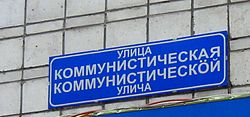Komi language
The Komi language (Komi: коми кыв, komi kyv), also known as Zyryan, Zyrian or Komi-Zyryan (Komi: коми-зырян кыв, komi-zyrjan kyv),[1] is one of the two types of the Komi language. The other type is Permyak.
| Komi language | ||||
|---|---|---|---|---|
| коми кыв komi kyv | ||||
| Native to | Russia | |||
| Region | Komi Republic, Nenetsia, Permyakia, Yamalia, Yugra, elsewhere in Russia | |||
| Native speakers | 160,000 (2010 census)e18 | |||
| Language family | Uralic
| |||
| Writing system | Cyrillic, Old Permic Script (Formerly) | |||
| Official status | ||||
| Official language in | ||||
| Language codes | ||||
| ISO 639-1 | kv | |||
| ISO 639-3 | kpv | |||
 | ||||
| ||||
Speakers
Komi is spoken by the Komi peoples native to the Komi Republic and other parts of Russia such as Nenetsia and Yamalia. There were 285,000 speakers in 1994. This went down to 160,000 in 2010.
Writings
It was written in the Old Permic alphabet (Komi: 𐍐𐍝𐍑𐍣𐍒, Анбур, Anbur) in the 14th century. The Cyrillic script was introduced by Russian missionaries in the 17th century. This script replaced the Old Permic script.
Komi Language Media
A sample of the Komi language words. Upper "Улица Коммунистическая" is in Russian, lower "Коммунистическӧй улича" is in Komi. Both mean "Communist street". This picture was taken in Syktyvkar, the capital of Komi Republic
References
- ↑ Komi language Britannica.
Bibliography
- Bartens, Raija (2000). Permiläisten kielten rakenne ja kehitys (in Finnish). Helsinki: Suomalais-Ugrilainen Seura. ISBN 952-5150-55-0.
{{cite book}}: CS1 maint: unrecognized language (link) - Abondolo, Daniel (2015). The Uralic Languages. Routledge
- R. M. Batalova. 1993. Komi(-Zyryanskij) Jazyk. In V. N. Jartseva (ed.), Jazyki Mira: Ural'skie Jazyki, 214–229. Moskva: Nauka.
- Fed'un'ova, G.V. Önija komi kyv ('The Modern Komi Language'). Morfologia/Das’töma filologijasa kandidat G.V.Fed'un'ova kipod ulyn. Syktyvkar: Komi n’ebög ledzanin, 2000. 544 pp. ISBN 5-7555-0689-2.
Other websites
 Media related to Komi language at Wikimedia Commons
Media related to Komi language at Wikimedia Commons
| This language has its own Wikipedia project. See the Komi language edition. |
- Books in Komi-Zyrian from Finno-Ugric Electronic Library (by the Finno-Ugric Information Center in Syktyvkar, Komi Republic (interface in Russian and English, texts in Mari, Komi, Udmurt, Erzya and Moksha languages))
- Komi–Russian & Russian–Komi Online Dictionaries
- Tarabukin I.I. Komi–Russian Phraseological Dictionary. Archived 2011-11-23 at the Wayback Machine
- Komi Grammar. (in Russian)
- Komi-language courses
